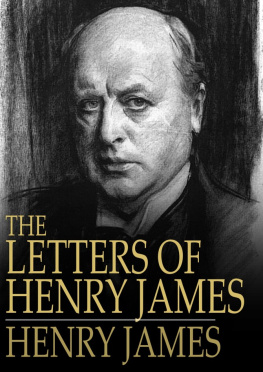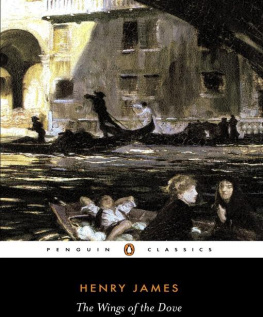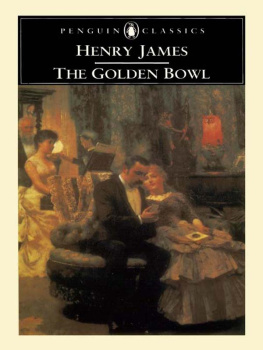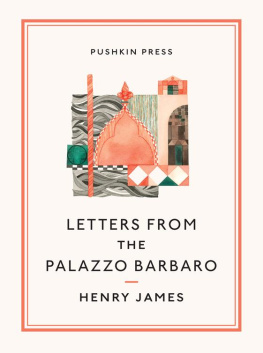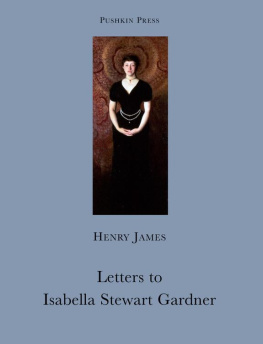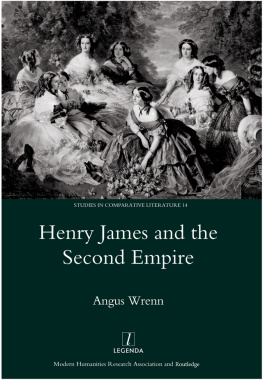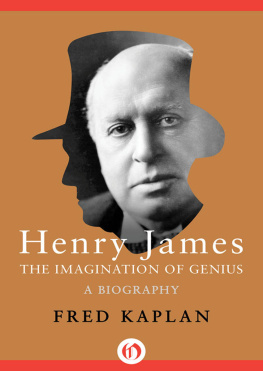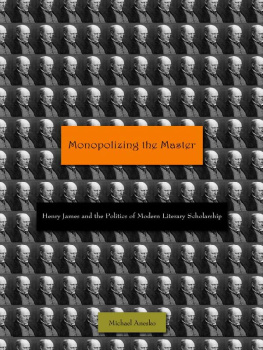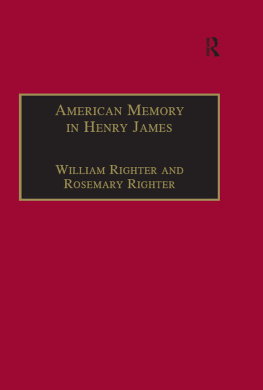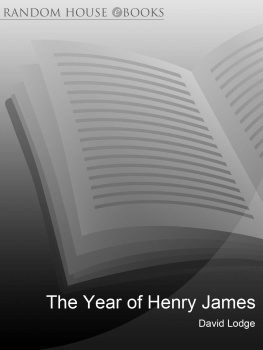Introduction
I
He was so admirable a letter-writer that they will constitute his real and best biography. This was said not of Henry James, but by him, of his brother William (in Letter 275). Applied to the correspondence of Henry himself, another admirable letter-writer, such a statement carries much conviction. If biography is literally life-writing, then whose writing better than the ones who lived the life in question? If that person is one of our greatest writers, the case is proportionately strengthened.
There is competition around James for biographical primacy. One can hardly ignore the late Leon Edels massive five-volume Life of Henry James, which the late A. L. Rowse described as the single greatest work of biography produced in our century. But in Jamess own words? From James himself we have two autobiographical books and part of a third, in which he takes himself up to the 1870s and his early years in England (A Small Boy and Others (1913), Notes of a Son and Brother (1914) and The Middle Years (1917)). In their chronology these great books, whose subject, like that of Wordsworths Prelude, is the growth of a writers mind, leave out most of Jamess career. This book sets out to render an account of Jamess whole span from 1864, when he attained his (legal) maturity and began to publish, to his death in 1916.
The best reason for reading literary biography is an interest in a writers works, and in how they came into being. Henry James: A Life in Letters takes the form it does in the belief that Jamess letters are among his works; that many of them are in themselves major works or contain major writing; and that a thoughtfully presented selection can constitute an involving narrative a narrative of passionate creation. James, himself often dubious about the public exposure of the private, was alive to the richness of the field; he told his old friend Charles Eliot Norton in 1899 that if a correspondence had the real charm, he would give it all the glory of the greatest literature (Henry James Letters IV, 123; hereafter HJL).
Letters observe different conventions from those of, say, novels, where the author customarily takes on the responsibility of introducing the characters and settings to the paying public. Private correspondents of a past time, who already share a frame of reference with their audience of (usually) one, and who are exercising what James called the unremunerated pen, can leave the unaided modern reader, whom they often neglect to bring into the picture, at something of a loss. The ideal is to have ones explications from the horses mouth. On New Years Day 1908 Jamess typist, Theodora Bosanquet, recorded in her diary (now in the Houghton Library, Harvard) that Mr James wrote letters and, dear man, explained all about the people he was writing to I do enjoy his letter-writing mornings. Explaining where possible in Jamess own vivid words from elsewhere, or those of some close witness, I have tried to produce a similar enjoyment. When James himself first presented in print a set of letters, putting together his (reluctantly written) memoir of a pretentious American sculptor-poet in Rome, William Wetmore Story and His Friends (1903), the practice he evolved was a remarkably imaginative way of reading them, attempting the fullest possible recovery of the time and place and relation within which they had their original sense. After quoting one letter he remarks, Ghosts enough, verily, with a little encouragement, would peep out of the foregoing (1, 257) then spends several pages teasing the phantoms out into a dense fabric of reminiscences and anecdotes. The system here of introductory headnotes and accompanying footnotes aims to help readers feel and understand by how full and sometimes tangled a web James himself was connected with his world.
I have been influenced also by Jamess forceful words to Edmund Gosse in 1912, on the editing of the letters of their dead friend George Meredith:
What lacerates me perhaps most of all in the Meredith volumes is the meanness and poorness of editing the absence of any attempt to project the Image (of character, temper, quantity and quality of mind, general size and sort of personality,) that such a subject cries aloud for; to the shame of our purblind criticism. [Selected Letters of Henry James to Edmund Gosse, 18821915, 273; hereafter SLHJEG]
I have tried in this book to make James project his own Image, by taking quotations from the whole body of his writings (including much unpublished correspondence); but I have sought also to give an image of his place and time by weaving in quotations and information derived from other sources. Jamess is not here the only voice; others, often critical of James, make themselves heard, including Theodore Roosevelt, Edith Wharton, George Bernard Shaw and H. G. Wells. The James in this book is unavoidably the centre of interest, but is a centre partly in the Jamesian sense (used, e.g., in Letter 170) of a character whose temper, quantity and quality of mind cannot be separated from the world he or she witnesses and lives through.
This James, then, does not entirely conform to the antithesis he himself drew and was drawn by, between the essentially solitary artist and the urbane socialite. He wittily conjures this division shortly after his settlement in London in 1877, writing to his sister Alice of his surprise and disappointment in meeting at a dinner a poet he greatly admires, Robert Browning. James deplores Brownings unpoetic behaviour, his shrill interruptingness, but then reconciles himself to the apparent contradiction with the conceit that evidently there are 2 Brownings an esoteric & an exoteric. The former never peeps out in society, & the latter hasnt a ray of suggestion of


